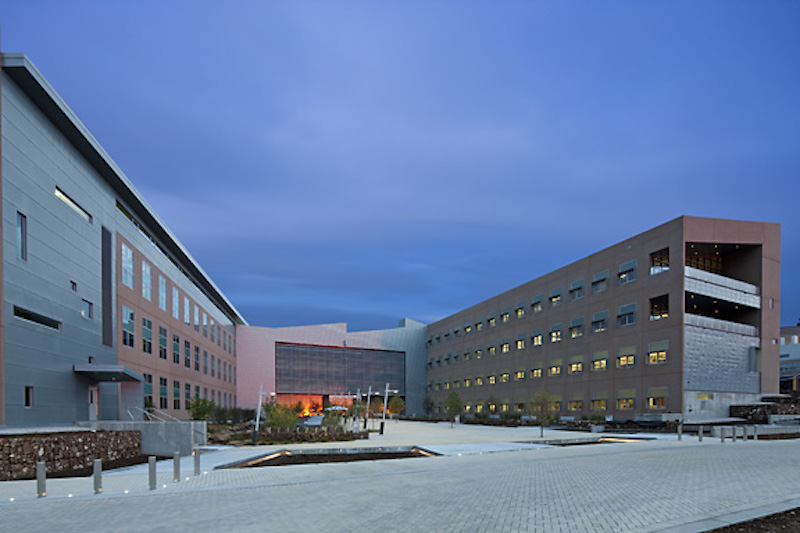Stantec, the global engineering and design firm, bolstered its position geographically and in several business sectors with its acquisition of Denver-based RNL Design, the architectural, interior, and urban design firm.
Terms of the agreement, which is expected to close next month, were not disclosed.
Josh Gould, RNL’s chairman and CEO, tells BD+C that his company decided to put itself up for sale about 18 months ago, and entered into serious discussions with Stantec at the beginning of this year.
“We’ve been autonomous for more than 60 years, so our board didn’t make this decision lightly,” he says. However, the board concluded that RNL couldn’t achieve the kind of market reach it wanted with its existing platform in a consolidating industry “that is changing rapidly,” says Gould.

Josh Gould, RNL Design's chairman and CEO, will become a sector leader in Stantec's Buildings group. Image: Stantec
RNL joins Stantec with 134 employees and offices in Denver, Los Angeles, Phoenix, Washington, D.C., and Abu Dhabi, UAE. But, says Gould, RNL “really didn’t have a lot of coverage in the United States outside of Denver. We have several national and international clients, and they needed broader coverage.”
It gets that with Stantec, whose 22,000 employees are spread over 400-plus locations and six continents. Last year, Stantec, which is based in Edmonton, Alberta, reported $4.3 billion Canadian (US$3.2 billion) in revenue, and C$130.5 million in net income.
Stantec’s business model over the past several decades has been to grow into sectors through acquisition (it’s made over 125 deals). Stantec is active in five sectors: Buildings, from which it generates about 23% of its revenue; Water, which also accounts for 23%, and became a more important part of the company after its March 2016 acquisition of Denver-based MWH Global; Infrastructure (26% of revenue), Energy and Resources (12%), and Environmental Services (16%).
RNL’s management team is staying on with Stantec, and Gould will become its Buildings Sector Leader. Eventually, he will take a leadership role in expanding Stantec’s Civic business.
“RNL has an abundant portfolio in the Civic sector, especially in public transit,” says Leonard Castro, Stantec’s Executive Vice President-Global Buildings Practice. RNL’s notable public transit projects include providing architectural, interior, and sustainable design for the 540,000-square-foot Los Angeles County Metropolitan Transportation Authority (Metro) Division 13 Bus Operations & Maintenance Facility, the first ground-up bus operations and maintenance facility for Metro in 30 years.
Castro says Stantec also saw RNL’s position in Denver and in the Middle East as plusses for the larger’s company’s growth ambitions. “Denver is a strategic market for Stantec, and it’s just a better [location] platform to service our clients” than Edmonton is. He adds that Denver is “exceptional” for its engineering schools.

One of RNL's recent projects is the Research Support Faiclity at the National Renewable Energy Lab in Colorado. Image: Courtesy of Stantec
RNL’s strengths in sustainability, resilience, and urban design should solidify Stantec’s position in each, especially given Stantec’s recent “Urban Places” initiative that targets projects related to city living, says Castro. Among RNL’s recent projects is a 190,000-sf net-zero-energy operations building on 36 acres for the Denver Water Board, and the 340,000-sf Research Support Facility at the National Renewable Energy Lab (NREL) in Golden, Colo., for which RNL provided architecture and interior design, site planning, and landscape architecture.
Stantec, says Castro, also believes that having RNL’s architectural design expertise could be a critical advantage in capturing projects for its Water division.
Stantec was MEP engineer on the NREL project, one of a half-dozen that Stantec and RNL had worked on together prior to this acquisition.
New leadership
Coincident to the Stantec-RNL transaction, Stantec announced that its president and CEO of eight years, Bob Gomes, would retire at the end of this year. Gomes, who started working for the company in 1988, oversaw Stantec’s international expansion. Between the first quarter of 2009 and the first quarter of 2017, Stantec also completed nearly 50 acquisitions, and enjoyed a revenue bounce of 229%.
Replacing Gomes, effective January 1, 2018, will be Gord Johnson, a 20-plus-year Stantec vet and, since 2015, Executive Vice President of its Infrastructure business unit.

Gord Johnson (left) will become Stantec's president and CEO on January 1, 2018, replacing Bob Gomes, who has held that position for more than eight years. Image: Stantec
In an interview with the Edmonton Sun following his appointment, Johnson pointed to the company’s diversification strategy as one of the main reasons why it has been able to weather economic shifts in different markets. “We have never been more diversified than we are now,” notes Castro.
Johnson also said Stantec, under his leadership, would look to expand its platform in places where it already has solid footprints, such as the United Kingdom, Australia, and New Zealand.
Related Stories
Adaptive Reuse | Oct 22, 2024
Adaptive reuse project transforms 1840s-era mill building into rental housing
A recently opened multifamily property in Lawrence, Mass., is an adaptive reuse of an 1840s-era mill building. Stone Mill Lofts is one of the first all-electric mixed-income multifamily properties in Massachusetts. The all-electric building meets ambitious modern energy codes and stringent National Park Service historic preservation guidelines.
MFPRO+ News | Oct 22, 2024
Project financing tempers robust demand for multifamily housing
AEC Giants with multifamily practices report that the sector has been struggling over the past year, despite the high demand for housing, especially affordable products.
Performing Arts Centers | Oct 21, 2024
The New Jersey Performing Arts Center breaks ground on $336 million redevelopment of its 12-acre campus
In Newark, N.J., the New Jersey Performing Arts Center (NJPAC) has broken grown on the three-year, $336 million redevelopment of its 12-acre campus. The project will provide downtown Newark 350 mixed-income residential units, along with shops, restaurants, outdoor gathering spaces, and an education and community center with professional rehearsal spaces.
Office Buildings | Oct 21, 2024
3 surprises impacting the return to the office
This blog series exploring Gensler's Workplace Survey shows the top three surprises uncovered in the return to the office.
Healthcare Facilities | Oct 18, 2024
7 design lessons for future-proofing academic medical centers
HOK’s Paul Strohm and Scott Rawlings and Indiana University Health’s Jim Mladucky share strategies for planning and designing academic medical centers that remain impactful for generations to come.
Sports and Recreational Facilities | Oct 17, 2024
In the NIL era, colleges and universities are stepping up their sports facilities game
NIL policies have raised expectations among student-athletes about the quality of sports training and performing facilities, in ways that present new opportunities for AEC firms.
Codes and Standards | Oct 17, 2024
Austin, Texas, adopts AI-driven building permit software
After a successful pilot program, Austin has adopted AI-driven building permit software to speed up the building permitting process.
Resiliency | Oct 17, 2024
U.S. is reducing floodplain development in most areas
The perception that the U.S. has not been able to curb development in flood-prone areas is mostly inaccurate, according to new research from climate adaptation experts. A national survey of floodplain development between 2001 and 2019 found that fewer structures were built in floodplains than might be expected if cities were building at random.
Seismic Design | Oct 17, 2024
Calif. governor signs limited extension to hospital seismic retrofit mandate
Some California hospitals will have three additional years to comply with the state’s seismic retrofit mandate, after Gov. Gavin Newsom signed a bill extending the 2030 deadline.
MFPRO+ News | Oct 16, 2024
One-third of young adults say hurricanes like Helene and Milton will impact where they choose to live
Nearly one-third of U.S. residents between 18 and 34 years old say they are reconsidering where they want to move after seeing the damage wrought by Hurricane Helene, according to a Redfin report. About 15% of those over age 35 echoed their younger cohort’s sentiment.

















